The Russian Federation has not adopted a code. There are different types of codes. For example in religion and philosophy exist. A duel between raznochintsy is possible, but is an anomaly, not meeting its purpose
1. What is a "code"?
1. What is a "code"?
2. Synonyms of the word "code".
3. The history of the appearance of the word "code".
4. Code in Russia.
5. Types of codes.
6. Codification.
7. Rules for the duel.
8. Conclusion.
9. My opinion about the word "code".
10. List of references.
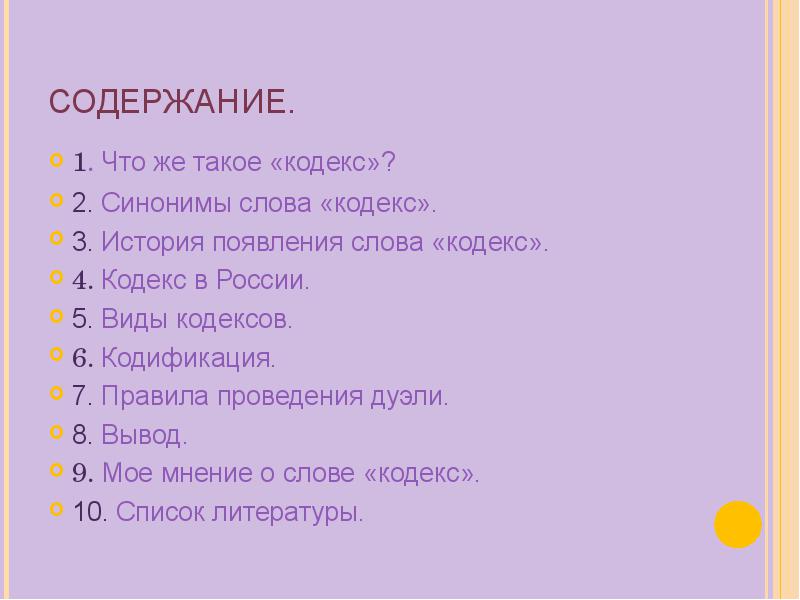
Dictionary legal terms gives this definition: Code(lat. codex
You can take economic, and financial, and any other dictionary and look at the definition of this mysterious word, but in Dahl's dictionary fixed the main meaning . Code(lat. - a book of a lawyer) - a code of laws, a code of laws.
Glossary of legal terms gives this definition: Code(lat. codex- collection of laws) - a consolidated legislative act, which combines and systematizes legal norms governing similar, homogeneous public relations. Codes are the result of the codification activity of the legislator. By general rule The Code refers to a specific branch of law (for example, civil, criminal, family, labor, etc.)

In the dictionary of Russian synonyms
In the dictionary of Russian synonyms
a number of "brothers" of the code are given, for example:
Book, code of laws;
Bushido (Japanese - the way of the warrior);
Act (from lat. actus - action - actum - document);
Talmud (ancient Hebrew talmūd - teaching);
Manuscript (collective name for texts written by hand)
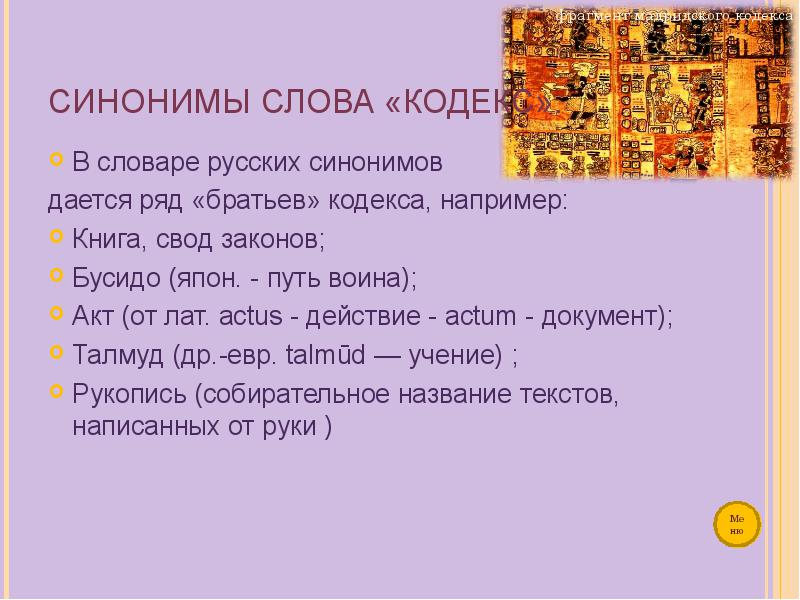
Perhaps the first universal code, which was a set of universal human values and rules of conduct, was the set of religious rules "The Ten Commandments of the Old Testament".
Later, codes appeared that determined the behavior of individual social groups in society. A clear example of this can be found in the history of Japan - the Code of the Samurai "Bushido".
In the future, the need for private codes (for example, codes of associations, professions, etc.) arose due to the fact that universal norms were not enough to regulate human behavior in specific situations. Particular cases concretized the general principles in relation to the features of a particular activity.
Thus, until the XX century. there were 2 variants of norms of behavior - universal religious norms and non-religious codes of individual professions.
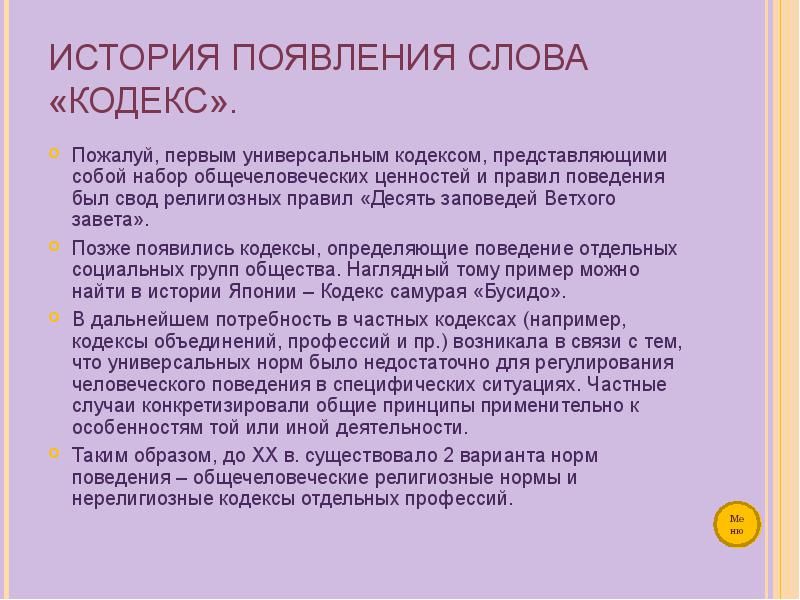
The collection of laws published by Yaroslav the Wise, called "Russian Truth", was the first annalistic code of judicial laws of ancient Rus'-Ukraine, uniting civil and criminal law and all judicial processes of that historical time, covering the entire 11th century.
And in 1912, the Code "Seven Principles of Doing Business in Russia" was created in Russia. The rules were clear to everyone:
respect authority;
be honest and truthful;
respect the right of private property;
love and respect the person;
be true to your word;
live within your means;
be purposeful.
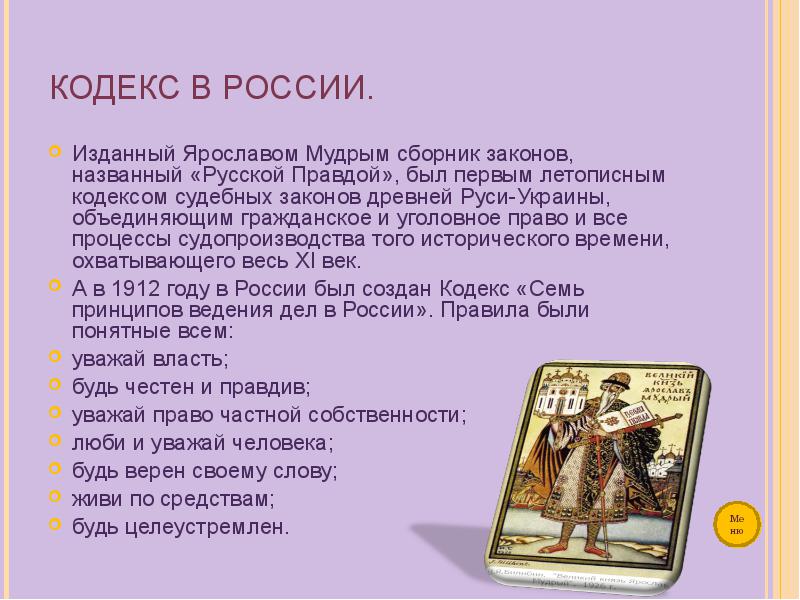
professional
There are two types of codes currently in use. professional and corporate, which regulate the relations of people within these groups.
But also in history there are code of honor, dueling code, Napoleonic code and many others.
All codes are based on Codification.
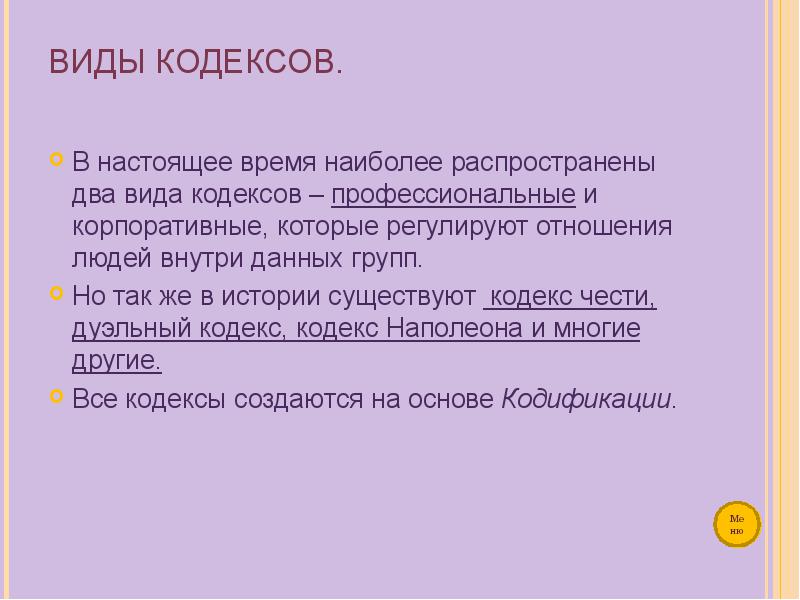
Codification
Codification- ordering of any text, renumbering of its parts, division into chapters, subchapters, paragraphs. Codification plays an important progressive role in the history of various ancient and modern texts. Codification is constantly used by people to compose books, magazines, etc.
There are different types of codes. For example, in religion and philosophy there are:
bible codification
Final Codification of the Qur'an
in 656; Mr. Zeid;
Codification of the works of ancient philosophers
fov: Plato, Aristotle;
etc.

There are a huge number of different codes, it is not realistic to consider all of them. Therefore, I want to talk about the code that interested me the most.
It's about the Dueling Code.
Dueling Code- an informal set of rules for a duel. In an era when duels were widespread, there were no dueling codes, since the very concept of a duel was in conflict with existing law, although, on the other hand, it was inextricably linked with the concept of noble honor.
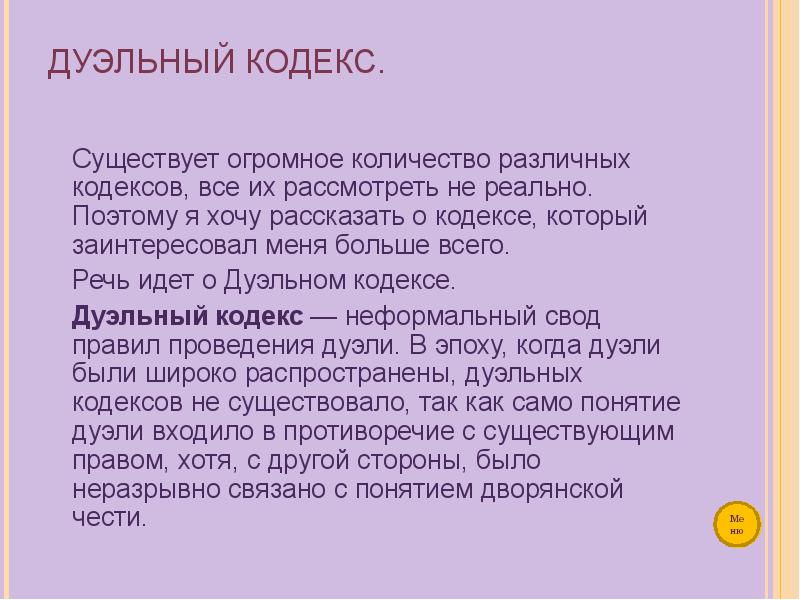
The rules for dueling were based on precedent, although there were some informal generally accepted principles. Here are some of them:
A duel can and should only take place between equals.
An insult can only be inflicted by an equal to an equal.
A person who is inferior to another can only violate his right, but not offend him.
A duel between raznochintsy is possible, but is an anomaly, not meeting its purpose.
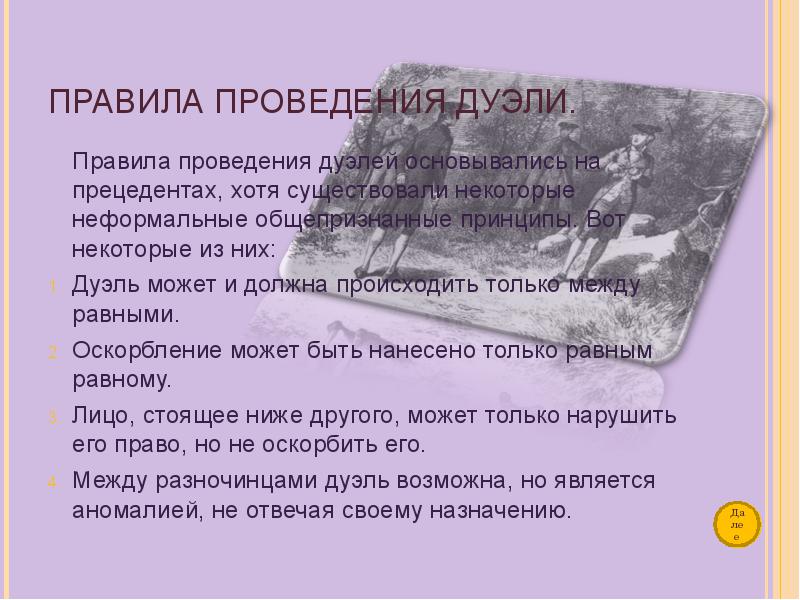
Only as the nobility begins to decline do attempts arise to codify dueling norms (V. Durasov’s dueling code published in pre-revolutionary Russia is known), although in this case none of the published dueling codes was binding, but was only “ recommendation."
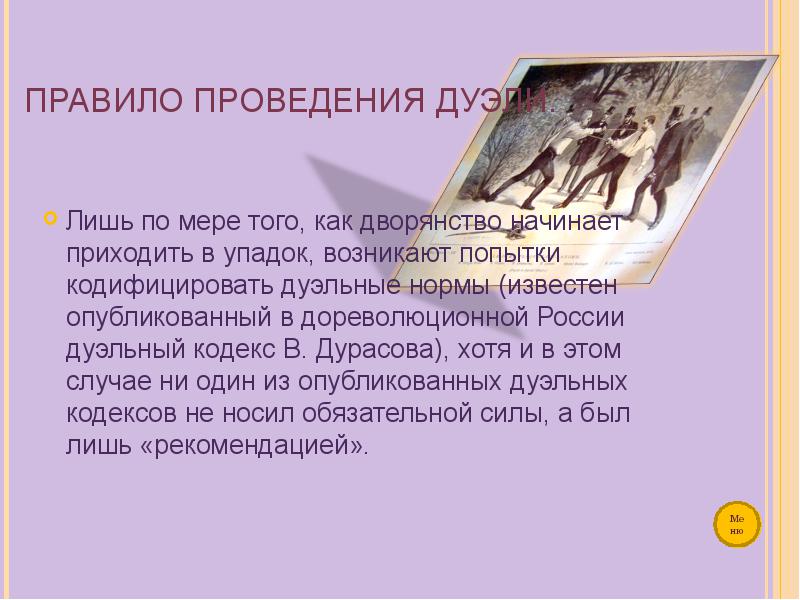
The word "code" is an interesting, but at the same time important word.
Based on the expansion of phraseological connections, a word can develop a new meaning, so many writers used it in their works and created their own codes, for example:
from Goncharov: code Affairs of the Heart ("Ordinary History"), from Saltykov-Shchedrin: code worldly wisdom ("Innocent stories"); from Dostoevsky: code morality (“Winter notes about summer impressions”), code propriety, etc.
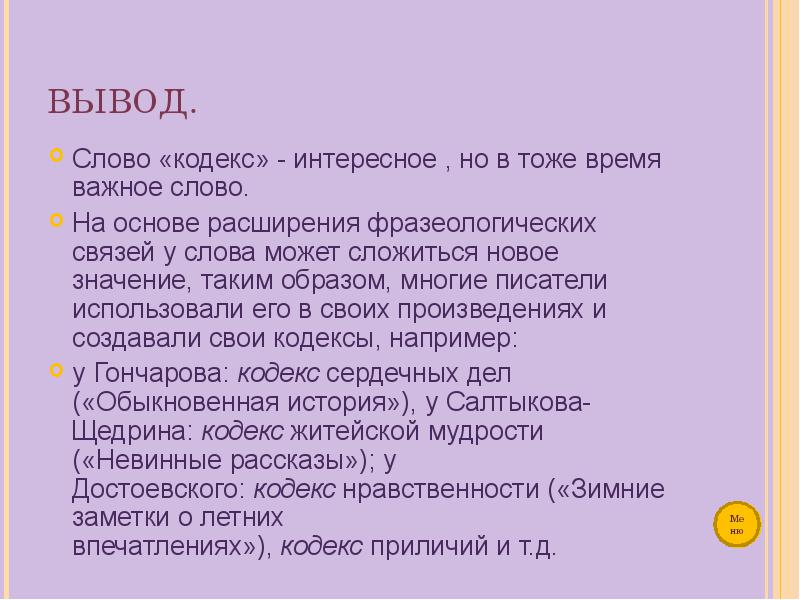
For me, the word "code" has always meant something important. For the first time I heard this word in the phrase "code of honor", so already in childhood I understood that this word was serious and significant. Even the word itself, when pronounced, seems somehow proud, sonorous. The sound "E", formed by the letter "E" in this word, gives it a solid sound and a certain heaviness.
Thus, it can be said that even after reading or hearing this word, not knowing what it means, it is not difficult to guess its importance.

Establishes public relations for bringing to administrative responsibility, as well as establishing general principles, a list of all administrative offenses (which can be supplemented by regional level), bodies considering cases, the procedure for bringing to administrative responsibility and the procedure for the execution of decisions on administrative cases.
The main source regulating the conduct of arbitration proceedings, that is, cases related to entrepreneurial activity.
Sets general principles budget legislation of the Russian Federation.
The main source regulating relations in the field of water use.
Fixes legal framework use of the airspace of the Russian Federation and activities in the field of aviation.
Regulates urban planning (i.e., with activities for the development of territories, including cities and other settlements) and certain related relations.
Regulates civil law relations. The Civil Code takes precedence over others federal laws and other regulatory legal acts in the field civil law.
Establishes rules for the consideration and resolution of civil cases by courts of general jurisdiction.
Regulates relations related to residential premises, their use, housing rights of citizens.
Defines the relations on the use and protection of land in the Russian Federation as the basis for the life and activities of the peoples living in the relevant territory (land relations).
Code of Administrative Procedure Russian Federation N 21-FZ
Merchant Shipping Code of the Russian Federation April 30, 1999 N 81-FZ
Defines the relations that arise between organizations, consignors, consignees, passengers and other persons in the course of navigation on inland waterways.
It is the main source regulating relations in the field of forest management.
A codified legislative act establishing a system of taxes and fees, relations with the Federal Tax Service.
Regulates family relations (marriage, divorce, guardianship, adoption, etc.).
Customs Code of the Customs Union Appendix to the Treaty on the Customs Code of the Customs Union, decision Interstate Council of the Eurasian Economic Community (the supreme body of the Customs Union) at the level of heads of state of November 27, 2009 N 17 CUSTOMS CODE OF THE CUSTOMS UNION , as amended by the Agreement dated May 29, 2014).
Until 2010, the Customs Code of the Russian Federation Defined the legal, economic and organizational foundations of customs and was aimed at protecting the economic sovereignty and economic security of the Russian Federation, enhancing the ties between the Russian economy and the world economy. In connection with the adoption of the Federal Law on Customs Regulation No. 311-FZ dated November 27, 2010 and the Customs Code of the Customs Union of the Russian Federation of 2017, this code has become invalid.
Defines labor relations between employees and employers and takes precedence over other adopted federal laws related to labor relations.
The main source of penitentiary law, which regulates social relations arising in the process and in connection with the execution of all types of criminal penalties and the application of other measures of a criminal law nature.
The main source of criminal procedure law, which establishes the procedure for investigating and considering criminal cases in court.
Main and the only source of criminal law, the only normative act establishing criminality and punishability of acts.
The word code can be applied in a broad sense. For example, a code of honor, a code of grammatical rules, a moral code. What is a code in the narrow sense? A legislative act that contains systematized norms relating to any branch, part of the branch or several branches of law is called a code. The structure of the code often reflects the industry system. Let's move on to the definition of what a code of laws is.
The set of laws that describe the norms of conduct in any particular area of activity is called a code of laws.
The following codes exist in the Russian Federation:
- GK - civil Code
- Code of Civil Procedure - Code of Civil Procedure
- NK - tax code
- UK - criminal code
- PEC - penal code
- Criminal Procedure Code - Code of Criminal Procedure
- T K - labor Code
- APK - arbitration procedural code
- water code
- BC - budget code
- Air Code
- ZhK - housing code
- LK - forest code
- ZK - land code
- Customs Code
- SC - family code
- Urban planning code
Civil Code
It is the main source of civil law. Let's find out what the civil code is. This is a single systematized code of laws that regulates civil law relations. It has a priority position over other normative legal acts regulating the sphere of civil law.
In the Russian Federation, the current Civil Code entered into force on January 1, 1995. It is a set of norms-principles:
- Rules that guarantee the free movement of goods, funds and services, the freedom of economic activity and the promotion of competition.
- Norms on securing for everyone the right to privacy, family and personal secrets, the right to protection of honor.
- Norms on the right to housing and its inviolability.
- Norms on the protection of the law of the rights to private property.
- Rules on the right of everyone to receive state compensation for harm caused by illegal actions of public authorities or their representatives.
Labor Code
Next, we learn what a labor code is. The Labor Code, which establishes guarantees labor rights and freedoms of citizens, creating favorable working conditions, protecting the interests and rights of employers and employees, is called the labor code.
The Labor Code of the Russian Federation entered into force on February 1, 2002. It establishes the obligations and rights of the employer and employee, regulates labor protection, issues of vocational training and retraining, advanced training and employment, and social partnership. It establishes the rules for the regulation of labor and its payment, the procedure for resolving arising labor disputes.
Criminal Code
Let's define what a criminal code is. The Code of Laws, which determines the degree of criminality of socially dangerous acts and establishes penalties for them, as well as applies other measures of a criminal law nature. The Criminal Code usually includes a general and a special part. The general part contains general provisions and guidelines. The special part includes definitions of specific types of crimes and punishments for them. The Criminal Code of the Russian Federation entered into force on January 1, 1997. He replaced the Criminal Code of the RSFSR, which had been in force since 1960.
tax code
In conclusion of the article, consider what the tax code is. The code of laws that regulates taxation, the entire system of fees and taxes, is called the tax code.
The Tax Code of the Russian Federation consists of 2 parts:
- The first establishes general principles for the payment of fees and taxation in the Russian Federation. It entered into force on January 1, 1999.
- The second part establishes the principles for the payment and calculation of each of the fees and taxes established by the Tax Code. It entered into force on January 1, 2001.







